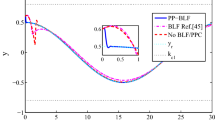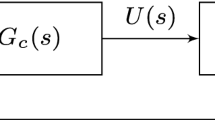Abstract
This paper presents a novel approach to state-feedback stabilization of polynomial systems with bounded actuators. To overcome limitation of the existing approaches, we introduce additional variables that separate the system matrices and the Lyapunov matrices. Therefore, parameterization of the state-feedback controllers is independent of the Lyapunov matrices. The proposed design condition is bilinear in the decision variables, and hence we provide an iterative algorithm to solve the design problem. At each iteration, the design condition is cast as convex optimization using the sum-of-squares technique and can be efficiently solved. In addition, the novel parameter-dependent Lyapunov functions are readily applied to robust state-feedback stabilization of polynomial systems subject to parametric uncertainty. Effectiveness of the proposed approach is demonstrated by numerical examples.
Similar content being viewed by others
References
Y. Wu and R. Lu, “Event-based control for network systems via integral quadratic constraints,” IEEE Transactions on Circuits and Systems I: Regular Papers, vol. 65, no. 4, pp. 1386–1394, 2018.
Y. Wu, R. Lu, P. Shi, H. Su, and Z. G. Wu, “Sampled data synchronization of complex networks with partial couplings and T-S fuzzy nodes,” IEEE Transactions on Fuzzy Systems, vol. 26, no. 2, pp. 782–793, 2018.
I. Ghous and Z. Xiang, “H¥ stabilization of 2-D discrete switched delayed systems represented by the Roesser model subject to actuator saturation,” Transactions of the Institute of Measurement and Control, vol. 37, no. 10, pp. 1242–1253, 2015.
I. Ghous, Z. Xiang, and H. R. Karimi, “State feedback H¥ control for 2-D switched delay systems with actuator saturation in the second FM model,” Circuits, Systems and Signal Processing, vol. 34, no. 7, pp. 2167–2192, 2015.
Y. Qian, Z. Xiang, and H. R. Karimi, “Disturbance tolerance and rejection of discrete switched systems with timevarying delay and saturating actuator,” Nonlinear Analysis: Hybrid Systems, vol. 16, pp. 81–92, 2015.
C. W. Scherer and C. W. J. Hol, “Matrix sum-of-squares relaxations for robust semi-definite programs, Mathematical Programming Series B, vol. 107, Nos. 1–2, pp. 189–211, 2006.
S. Boyd, L. El Ghaoui, E. Feron, and V. Balakrishnan, Linear Matrix Inequalities in Systems and Control Theory, SIAM, Philadelphia, 1994.
C. Albea and F. Gordillo, “Estimating the attraction domain for the boost inverter,” Asian Journal of Control, vol. 15, no. 1, pp. 169–176, 2013.
G. Chesi, “LMI techniques for optimization over polynomials in control: a survey,” IEEE Transactions on Automatic Control, vol. 55, no. 11, pp. 2500–2510, 2010.
P. A. Parrilo, “Semidefinite programming relaxations for semialgebraic problems,” Mathematical Programming Series B, vol. 96, no. 2, pp. 293–320, 2003.
M. M. Belhaouane and N. B. Braiek, “Design of stabilizing control for synchronous machines via polynomial modelling and linear matrix inequalities approach,” International Journal of Control, Automation, and Systems, vol. 9, no. 3, pp. 425–436, 2011.
C. Ebenbauer and F. Allgower, “Analysis and design of polynomial control systems using dissipation inequalities and sum of squares,” Journal of Computers and Chemical Engineering, vol. 30, no. 11, pp. 1601–1614, 2006.
H. Ichihara, “Optimal control for polynomial systems using matrix sum of squares relaxation,” IEEE Transactions on Automatic Control, vol. 54, no. 5, pp. 1048–1053, 2009.
H. Ichihara, “A Convex approach to state feedback synthesis for polynomial nonlinear systems with input saturation,” SICE Journal of Control, Measurement, and System Integration, vol. 6, no.3, pp. 186–193, 2013.
S. Prajna, A. Papachristodoulou, and F. Wu, “Nonlinear control synthesis by sum of squares optimization: a Lyapunov-based approach,” Proc. of the Asian Control Conference, Melbourne, Australia, 2004. pp. 157–165.
T. Jennawasin, M. Kawanishi, and T. Narikiyo, “Stabilization of nonlinear systems with bounded actuators using convex optimization,” Proc. of the 18th IFAC World Congress, Milano, Italy, pp. 6745–6750, August 2011.
H. J. Ma and G. H. Yang, “Fault-tolerant control synthesis for a class of nonlinear systems: sum of squares optimization approach,” International Journal of Robust and Nonlinear Control, vol. 19, no. 5, pp. 591–610, 2009.
Q. Zheng and F. Wu, “Regional stabilisation of polynomial nonlinear systems using rational Lyapunov functions,” International Journal of Control, vol. 82, no. 9, pp. 1605–1615, 2009.
T. Jennawasin, M. Kawanishi, T. Narikiyo, and C. L. Lin, “An improved stabilizing condition for polynomial systems with bounded actuators: an SOS-based approach,” Proc. of the IEEE Multi-Conference on Systems and Control, Dubrovnik, Croatia, pp. 258–263, October 2012.
J. B. Lasserre, “Global optimization with polynomials and the problems of moments,” SIAM Journal on Optimization, vol. 11, no. 3, pp. 796–817, 2001.
Y. Ebihara and T. Hagiwara, “New dilated LMI characterizations for continuous-time multi-objective controller synthesis,” Automatica, vol. 40, no. 11, pp. 2003–2009, 2004.
M. C. de Oliveira, J. C. Geromel, and J. Bernoussou, “Extended H2 and H¥ norm characterizations and controller parameterizations for discrete-time systems,” International Journal of Control, vol. 75, no. 9, pp. 666–679, 2002.
D. Peaucelle, D. Arzelier, O. Bachelier, and J. Bernussou, “A new robusr D-stability condition for real convex polytopic uncertainty,” Systems & Control Letters, vol. 40, no. 1, pp. 21–30, 2000.
S. Sajjadi-Kia and F. Jabbari, “Dilated-matrix inequalities for control design in systems with actuator constraint,” Proc. of 46th IEEE Conference on Decision and Control, New Orleans, USA, pp. 5678–5683, December 2007.
T. Jennawasin and D. Banjerdpongchai, “Design of statefeedback control for polynomial systems with quadratic performance criterion and control input constraints,” Systems & Control Letters, vol. 117, pp. 53–59, 2018.
Y. Wei, J. Qiu, H. R. Karimi, and M. Wang, “Model approximation for two-dimensional Markovian jump systems with state-delays and imperfect mode information,” Multidimensional Systems and Signal Processing, vol. 26, no. 3, pp. 575–597, 2015.
Y. Wei, J. Qiu, P. Shi, and M. Chadli, “Fixed-order piecewise-affine output feedback controller for fuzzyaffine-model-based nonlinear systems with time-varying delay,” IEEE Transactions on Circuits and Systems I: Regular Papers, vol. 64, no. 4, pp. 945–958, 2017.
Y. Wei, J. H. Park, J. Qiu, L. Wu, and H. Y. Jung, “Sliding mode control for semi-Markovian jump systems via output feedback,” Automatica, vol. 81, pp. 133–141, 2017.
T. Hu and Z. Lin, Control Systems with Actuator Saturation: Analysis and Design, Birkhauser, 2001.
K. Sawada, T. Kiyama, and T. Iwasaki, “Generalized sector synthesis of output feedback control with anti-windup structure,” Systems & Control Letters, vol. 58, no. 6, pp. 421–428, 2009.
S. Tarbouriech, G. Garcia, J. M. Gomes da Silva Jr., and I. Queinnec, Stability and Stabilization of Linear Systems with Saturating Actuators, Springer, 2011.
Author information
Authors and Affiliations
Corresponding author
Additional information
Recommended by Associate Editor Do Wan Kim under the direction of Editor PooGyeon Park. This work was supported by Rachadapisek Sompote Fund for Postdoctoral Fellowship, Chulalongkorn University.
Tanagorn Jennawasin received his B.Eng. degree in Electrical Engineering from Chulalongkorn University in 2001, and his M.S. and Ph.D. degrees in Mathematical Informatics from The University of Tokyo, in 2005 and 2008, respectively. From 2008–2011, he was a post-doctoral researcher in Control System Laboratory, Toyota Technological Institute. He joined the Department of Electrical Engineering, National Chung Hsing University and became an assistant professor there from 2012–2015. He joined the Faculty of Engineering, Chulalongkorn University as a researcher from 2016–2017. He is currently a lecturer at the Department of Control System and Instrumentation at King Mongkuts University of Technology Thonburi, Thailand. His research interests include control and estimation theories, optimization methods, robotics and systems biology.
Michihiro Kawanishi received his M.S. and Ph.D. degrees from Kyoto University, in 1994 and 1998, respectively. He was a research associate at Kobe University from 1996 to 2006. In 2006 he became an associate professor at Toyota Technological Institute. His research interests include control system design with numerical optimization and its application to mechanical systems. He is a member of IEEE, SICE, ISCIE, JSME, and RSJ.
Tatsuo Narikiyo received his B.S., M.S., and Ph.D. degrees from Nagoya University, Japan, in 1978, 1980, and 1984, respectively. He was a research scientist at the Government Industrial Research Institute from 1983 to 1990. In 1990, he joined the faculty of Toyota Technological Institute, where he is currently a Professor of Department of Advanced Science and Technology. His research interests include nonlinear control systems theory and robotics.
David Banjerdpongchai received his B.Eng. degree (First class honors) from Chulalongkorn University, and his M.S. and Ph.D. degrees from Stanford University, all in Electrical Engineering, in 1990, 1993, and 1997, respectively. Since 1990, he has been with the Department of Electrical Engineering, Faculty of Engineering, Chulalongkorn University. Currently, he is a professor of Electrical Engineering and the head of Control Systems Research Laboratory. He is a senior member of IEEE, a founding chair of IEEE Control Systems Society Thailand Chapter, and an executive committee member of ECTI Association. He serves as an associate editor of IJCAS. His research interests are advanced process control, robust control systems, convex optimization, and energy management systems.
Rights and permissions
About this article
Cite this article
Jennawasin, T., Kawanishi, M., Narikiyo, T. et al. Iterative LMI Approach to Robust State-feedback Control of Polynomial Systems with Bounded Actuators. Int. J. Control Autom. Syst. 17, 847–856 (2019). https://doi.org/10.1007/s12555-018-0292-6
Received:
Revised:
Accepted:
Published:
Issue Date:
DOI: https://doi.org/10.1007/s12555-018-0292-6




